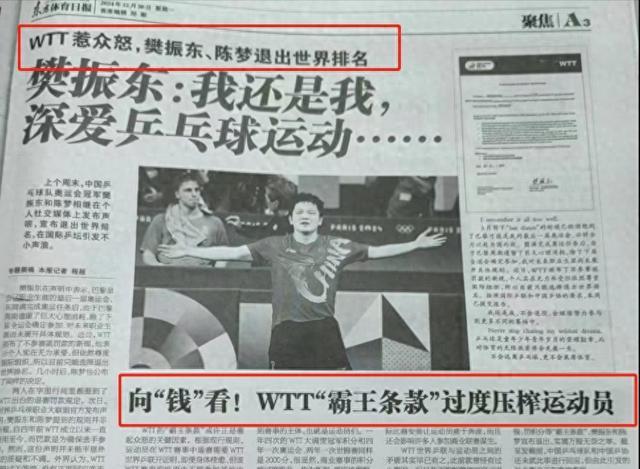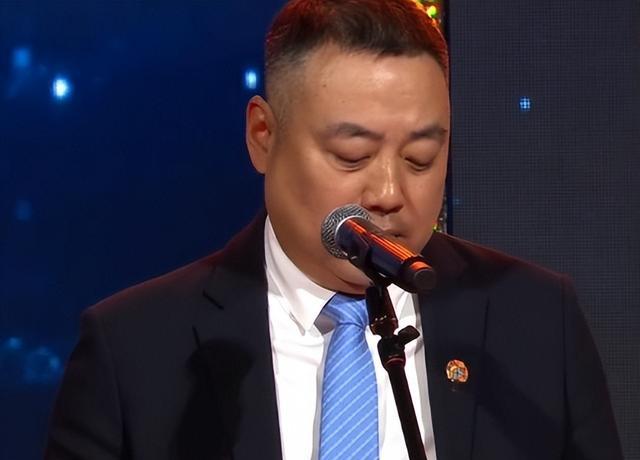Ongoing Fermentation! Fan Zhendong Appears on CCTV13, Supported by CCTV Journalists, Liu Guoliang Makes First Appearance After Controversy

At the end of 2024, two giants of Chinese table tennis, Fan Zhendong and Chen Meng, withdrew from the world rankings! What caused them to make such a surprising move? The answer quickly surfaced: the "tyrannical clause" introduced by the World Table Tennis Professional League (WTT), which not only focuses on money but also excessively exploits athletes. In response, CCTV13 rarely intervened, and even CCTV journalists directly pointed out the numerous problems with WTT.

Meanwhile, Liu Guoliang, who holds multiple positions, made his first public appearance, yet did not mention the controversy at all. This global table tennis storm, how will it evolve? How will Liu Guoliang balance the interests of all parties?

The focus of the controversy: Is the new WTT rule reasonable? The cause of the matter originated from a recent regulation issued by the World Table Tennis Professional League (WTT). This regulation, under the name of "standardization," imposed strict restrictions on the participation behavior of athletes. Specifically, unless due to health issues, athletes are not allowed to unilaterally absent themselves from WTT events, otherwise they will face huge fines. At the same time, if athletes participate in non-WTT competitions during WTT events, they will also be punished. The introduction of this regulation is very unfriendly to top players like Fan Zhendong and Chen Meng. Their event schedules are usually formulated by the national team as a whole, and individuals find it difficult to have complete control. If this regulation is strictly enforced, it will not only limit their choices for competition but may also bring them economic losses. More unsatisfactory is that WTT's approach when issuing this regulation seems quite brutal. It is reported that before the athletes received this notice, they were completely unaware. WTT did not communicate in advance or seek the opinions of the athletes, but instead directly required them to sign confirmation. Faced with this situation, although most athletes are dissatisfied, they can only choose to silently accept due to concerns about WTT's powerful influence. However, Fan Zhendong and Chen Meng bravely stood up, refused to sign, and announced their withdrawal from the world rankings, which immediately triggered widespread attention. WTT claims that this withdrawal fine system is not a new rule, but a regulation that has existed four years ago. However, Fan Zhendong insisted that he had never seen this regulation being implemented. "I have never received any notice about withdrawal fines," Fan Zhendong said on social media, "Until recently, WTT suddenly informed me that a new withdrawal penalty regulation will be implemented in 2025." Fan Zhendong's remarks sparked extensive discussions. Many people began to question: if this regulation really existed for a long time, why was it never strictly enforced before? Some people suspect that WTT is using this regulation to exploit the interests of athletes. The reason why WTT dares to be so tough is largely because of its special status in the table tennis world. As the World Table Tennis Professional League, WTT controls the hosting rights and operational rights of most important events. It is precisely this monopolistic position that makes many athletes dare not easily resist even if they are dissatisfied. At the same time, WTT's statement has also aroused considerable controversy. They claim that the original intention of this regulation is to "ensure that fans, organizers, event partners, and broadcast partners can continue to enjoy the wonderful performances of world-class players." However, this explanation driven by commercial interests ignores the physical and mental health and long-term needs of athletes' career development. Reactions from all parties: gaining widespread support With the escalation of the controversy, reactions from all parties have become increasingly intense. Many well-known international table tennis players have come forward to express their support for these two Chinese players. Among them, the most eye-catching is the open support of the Lebrun brothers and Simon Gauzy. Lebrun thanked them on social media for their courage to speak out. Simon Gauzy took a more direct approach, saying that he supports them in doing anything they want. Their statements quickly sparked heated discussions on social media, with countless fans reposting and expressing support, creating a tidal wave of voices across the entire table tennis world. The support of these international players not only provided strong spiritual support for Fan Zhendong and Chen Meng but also rapidly expanded the scope of influence of this issue. It highlights that this is not just a problem within the Chinese table tennis world but a common challenge faced by the entire sports industry. At the same time, China's official media also showed a rare unified stance. Mainstream media such as CCTV, Xinhua News Agency, and People's Daily all voiced their support for the two Chinese players. CCTV13 even conducted in-depth reporting on this matter during prime time for several consecutive days, inviting sports experts and legal experts for analysis and discussion. An editorial article published by Oriental Sports Daily attracted wide attention. The article pointed out that although the profits from commercial matches are undoubtedly important, they cannot come at the expense of the rights of athletes. If athletes are exhausted, it will not only affect their careers but also harm the long-term development of the entire sport in the long run. This highly consistent attitude not only reflects the support of Chinese media for their own athletes but also reflects the general doubts about WTT's practices. It sends a clear signal to the world: China will not stand idly by while the rights of its athletes are violated. Of course, the reaction of the fans is even stronger. On various social media platforms, topics supporting Fan Zhendong and Chen Meng continue to rise. People questioned WTT's approach, believing it was disrespectful to the athletes. A netizen's comment resonated strongly: "Athletes are not sacrificial lambs for commercial interests! WTT should respect the physical condition and personal choices of the athletes. Without basic respect, how can we talk about sportsmanship?" Another netizen raised questions from a legal perspective: "Does WTT have the right to formulate such stringent regulations? Does this involve restrictions on the personal freedom of athletes? There should be relevant laws to regulate this behavior." This unprecedented unity seems to herald a larger-scale protest looming. Many fans started to initiate petitions online, calling on WTT to revise the regulations. Some people even proposed organizing fans to boycott WTT matches to express their support for the athletes. Deep-seated reasons for the analysis As this storm continues to ferment, a series of disturbing facts gradually emerge. A in-depth investigative report by CCTV13 revealed the astonishing figures of WTT's event revenue. It is reported that the ticket revenue from the Chinese Grand Slam alone is as high as 60 million yuan. This figure does not include other commercial revenues such as sponsorship and broadcasting rights. Such a huge income forms a stark contrast with the bonuses received by the athletes. The bonus for the singles champion is only $100,000, which is a huge gap compared to other sports such as tennis and golf. This discovery further confirms whether WTT, while pursuing commercial interests, has overlooked the rights of athletes? More worrying is that this is not an isolated case. Surveys show that as early as April 2024, African table tennis leader Aruna was severely punished by WTT for missing a match due to absence. Aruna revealed that he was forced to miss the match due to chronic diarrhea but was mercilessly fined by WTT. Not only that, he also exposed WTT's arrears of bonuses on social media. As the investigation deepened, more details were revealed. WTT's event schedule has been widely questioned for being too dense, ignoring the physical load and recovery time of the athletes, raising doubts whether it truly prioritizes the health of the athletes. Experts warn that a dense schedule not only exhausts the athletes mentally and physically but also potentially harbors injury risks, and may even shorten their professional golden period. The exposure of these issues has triggered reflection in the sports industry on the management model of professional leagues. Many experts believe that a more transparent and fair management mechanism needs to be established to balance commercial interests and athlete rights. Some people propose establishing an independent athletes' association to better protect the interests of athletes. As the situation continues to develop, more and more stakeholders are beginning to participate in the discussion. Sponsors, media, sports management departments, etc., have all expressed their positions and views. The protest wave triggered by Fan Zhendong and Chen Meng has escalated into a global discussion that profoundly affects the future direction of table tennis. Liu Guoliang's embarrassing situation Just as the storm of public opinion is getting fiercer, the appearance of a key figure adds drama to the whole event. This person is Liu Guoliang, who holds the important positions of chairman of the Chinese Table Tennis Association and chairman of the WTT board at the same time. On December 30th's Super League final, Liu Guoliang made his first public appearance. Faced with the storm of public opinion, he avoided talking about the WTT controversy, revealing complex weighing and helplessness in silence. Some people think that Liu Guoliang's silence is a helpless move. As the chairman of the WTT board, it is difficult for him to openly criticize WTT's actions; as the chairman of the Chinese Table Tennis Association, he cannot ignore the interests of the national team athletes. Some people speculate that Liu Guoliang's silence may be a strategy. He may be actively coordinating behind the scenes, trying to find a balance. In any case, Liu Guoliang's situation is undoubtedly very embarrassing. How will he balance the interests of all parties? How to find a balance between commercial interests and the rights of athletes? The outcome of this storm will not only determine the future of Fan Zhendong and Chen Meng but may also reshape the
